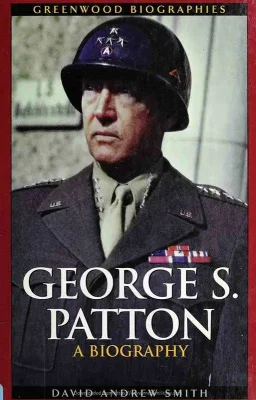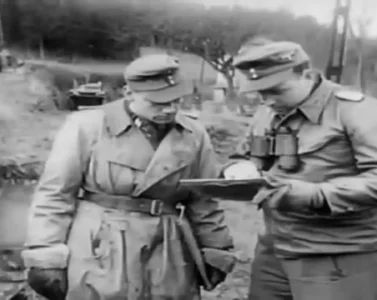- Military Library
- Literature
- WWII Books
- George S. Patton - A Biography (published 2003)
George S. Patton - A Biography (published 2003)
By David A. Smith - Greenwood Biographies
I would dare to say that most people have heard the name George S. Patton. Those who know military history are familiar with him and his actions, of course, but Patton is renowned among ordinary Americans in a way that few of our generals are. After Robert E. Lee and "Stonewall" Jackson (both of whom were heroes to Patton), after George Washington and Patton's contemporary Dwight Eisenhower, one inevitably comes across George Patton in the hallowed halls of American military leaders.
Some would say that Patton should be rated as high as number four on the all-time list. Like Lee and Jackson and Washington, Patton continues to captivate. As is the case with so much in modern American culture, Hollywood has made a fictionalized version of George Patton far more familiar to us than is the actual man. Once you see the movie Patton, and George C. Scott's singularly captivating portrayal of the general, it becomes difficult not to see Patton striding around on that stage, in front of a huge American flag, giving his famous speech to the troops. Except that it's George C. Scott we envision, not George S. Patton. All this is not necessarily a bad thing, though. It has kept his image, personality, and accomplishments in the public consciousness far better than otherwise may have been the case.
Patton won seven Academy Awards in 1970 including Best Picture, Best Actor, and Best Director, taking its place among the all-time greats. Because of this, the movie, and by an odd kind of cultural osmosis, its subject, remain part of the American cultural lexicon. But the movie, however, despite its attempts to show the many different sides and contradictions of Patton, is limited by time in what it can tell us, and still tends, therefore, to oversimplify the man.
Existing along with all the familiarity, there is something uncomfortable to many Americans about Patton. Despite an overall coarsening of the culture, a squeamishness remains about a man who faced his job so matter-of-factly. Perhaps it is even becoming more pronounced. But war meant and always will continue to mean killing and Patton had no desire to sanitize that central fact. War had to mean killing and killing in vast numbers. The army that killed more of its enemy faster and more efficiently usually won the fight. A tough fact, but there it is. Americans like their military heroes, but the dirty business of killing sometimes gets lost in the discussion of honor, valor, sacrifice, duty, patriotism, and the like.
We can talk about those concepts and see them on copious display in our heroic generals and can then go on about our lives drawing inspiration from these admirable qualities without ever even drifting into the more unpleasant business of killing enemy soldiers that war inevitably entails. We seem to like our generals more if they are removed a couple of steps from the actual bloodletting of combat. Dwight Eisenhower was a hero of World War II and one of the most popular presidents of the twentieth century. The vision of Ike that sticks with most people is his famous grin. That's a long way removed from combat in Europe, but then again, Ike was a planning general. He never led troops into combat. There's that sanitized military leader that we can embrace.
Contents of the book
- Series Foreword (ix)
- Preface (xi)
- Timeline (XVll)
- Chapter 1 - Ancestors and Expectations (1)
- Chapter 2 - Boyhood (9)
- Chapter 3 - Becoming a Warrior (17)
- Chapter 4 - Advancing in a Career (27)
- Chapter 5 - A Southern Adventure (35)
- Chapter 6 - World War I (41)
- Chapter 7 - Wandering (55)
- Chapter 8 - Into the Fight at Last (65)
- Chapter 9 - Risking Life and Career (79)
- Chapter 10 - Exile and Redemption (93)
- Chapter 11 - Finishing the Job (107)
- Chapter 12 - It Is Finished (119)
- Afterword (125)
- Bibliographic Essay (127)
- Index 129
- WWI (1914-1918)
- WWII (1939-1945)
- {{#owner}}
- {{#url}} {{#avatarSrc}}
{{name}} {{/url}} {{^url}} {{#avatar}} {{& avatar}} {{/avatar}} {{name}} {{/url}} - {{/owner}} {{#created}}
- {{created}} {{/created}}

































